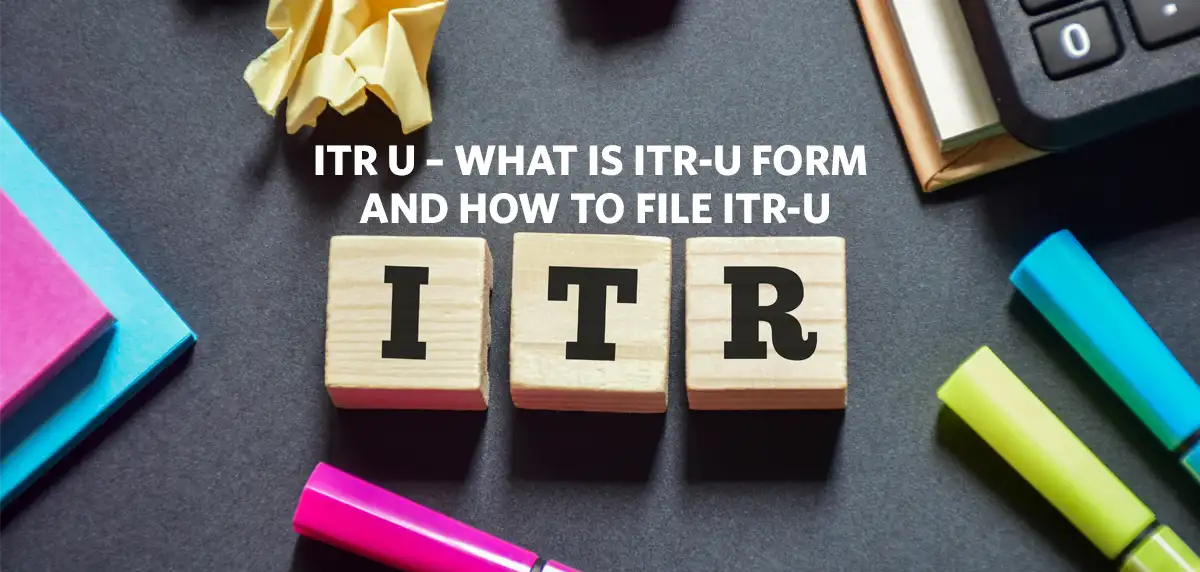Filing income tax returns is an important aspect of the tax structure in India. And it is mandatory for tax-paying individuals to file returns accurately. However, errors like underreporting income details or even missing the filing of the original Income Tax Return (ITR) is quite common. This is when the ITR-U form comes into play. Introduced by the Income Tax Department of India, the ITR-U form provides an opportunity to rectify mistakes made in the originally filed returns.**
Let’s delve into the details of the ITR-U form, and understand the purpose, eligibility, procedure, and benefits.
What is ITR-U?**
The ITR-U, also known as the Updated Income Tax Return, is a form introduced by the Income Tax Department of India under Section 139(8A) of the Income Tax Act. It allows taxpayers to update their previously filed income tax returns within a specified time frame. The primary aim of this form is to provide individuals and businesses with a convenient way to correct any discrepancies, declare additional income, or rectify any errors made in their original income tax return filing.
The ITR-U form came into effect from the financial year 2021-22 and provides a window of up to two years from the end of the relevant assessment year to make updates. This initiative aims to reduce tax evasion and promote transparency in tax filings.
Key Features of the ITR-U Form
Time Window:
Taxpayers have a maximum of two years from the end of the relevant assessment year to file an updated return.
Purpose:
The form can be used to report omitted income, correct mistakes, or rectify any inaccuracies in the original tax return.
Additional Tax Liability:
If the updated return increases the taxpayer's liability, an additional tax amount, along with interest, must be paid.
Limited Corrections:
The form is strictly for updating income tax returns and does not apply to other types of returns, such as GST returns.
Penalty:
Filing an updated return under ITR-U may attract penalties based on the timing and amount of the tax under-reported.
Why Was ITR-U Introduced?**
The introduction of the ITR-U form is a part of the government's initiative to promote voluntary tax compliance. Over the years, the Income Tax Department has noticed that many taxpayers either inadvertently or intentionally omit certain income or miscalculate their tax liability. This often leads to under-reporting of income, which directly impacts the revenue collected by the government.
By introducing the ITR-U form, the government has provided a second chance to taxpayers who have made errors in their original ITR filing. This not only benefits the taxpayers but also improves the overall tax compliance rate in the country.
Benefits to Taxpayers
Reduced Legal Complications:
Filing ITR-U allows taxpayers to avoid legal notices and scrutiny from the tax department.
Minimised Penalties:
Compared to the penalties imposed for non-disclosure, the penalties under ITR-U are significantly lower.
Correcting Genuine Mistakes:
Individuals who have made honest mistakes in their returns can now rectify them without the fear of prosecution.
Enhancing Transparency:
Updating ITR ensures a transparent tax-filing process, contributing to the nation's revenue growth.
Legal Framework of ITR-U**
The legal foundation of ITR-U is governed by Section 139(8A) of the Income Tax Act, 1961. This section was introduced as part of the Finance Act, 2022, allowing taxpayers to voluntarily update their income tax returns within two years from the end of the relevant assessment year.
The primary objective of this legal framework is to:
- Encourage voluntary tax compliance.
- Reduce tax evasion.
- Increase government revenue.
- Promote transparent tax reporting.
The law explicitly states that the taxpayer will need to pay an additional tax, depending on when the updated return is filed. This provision acts as a corrective mechanism rather than punitive action, ensuring that taxpayers willingly come forward to correct their mistakes.
Who Can File ITR-U?**
The ITR-U form is designed to cater to individuals, businesses, and entities that meet certain conditions. The eligibility criteria for filing an updated income tax return are as follows:
Eligible Taxpayers
1. Individuals who have omitted income or made calculation errors in their previous ITR.
2. Businesses that have failed to report revenue, income, or made incorrect deductions.
3. Partnership Firms and LLPs that have under-reported income or missed reporting transactions.
4. Companies that realized misreporting of profits or deductions after filing the original return.
Ineligible Taxpayers
1. Taxpayers who have already been served a tax notice by the Income Tax Department.
2. Individuals or businesses under investigation or scrutiny.
3. Cases where the department has already completed tax assessment.
4. Returns involving fraudulent income declarations or income from undisclosed sources.
How to Calculate Tax Payable for ITR-U**
Your total income tax liability while filing ITR-U would be as under:
Total Income Tax Liability = Tax Payable + Interest + Late-Filing Fees + Additional Tax
Net Tax Liability = Total Income Tax Liability – TDS/TCS/Advance Tax/Tax Relief
The government has provided a clear breakdown for calculating tax payable when filing ITR-U:
Tax Payable:
Calculate the total tax on the income you omitted in your original ITR.
Interest:
Interest will be levied as per Section 234A, 234B, and 234C for late payment.
Late-filing Fees:
If you missed the original filing deadline, applicable fees will be charged.
Additional Tax:
Depending on the time of filing ITR-U, an additional tax of 25% to 70% will apply.
Documents Required for Filing ITR-U**
Filing an ITR-U form requires specific documents to ensure accurate reporting of income, tax liability, and any omissions from the original return. Having the necessary documents in place can expedite the filing process and minimise errors. Below are the key documents required:
1. PAN Card
2. Aadhar Card
3. Original ITR Acknowledgement Number
4. Bank Statements
5. TDS Certificates (Form 16/16A)
6. Proof of Additional Income (if any)
7. Self-Assessment Tax Challan (if applicable)
8. Form 26AS
9. Revised Financial Statements (for businesses)
Having these documents readily available reduces the chances of discrepancies or rejection of the updated return.
Expanded Step-by-Step Guide to File ITR-U**
Here is an in-depth, detailed guide to filing ITR-U:
Step 1: Log in to the Income Tax e-Filing Portal
Visit the official Income Tax Department website at incometax.gov.in.
Step 2: Navigate to the 'e-File' Section
Go to the e-File tab and click on File Income Tax Return.
Step 3: Select the ITR Form
Select the relevant ITR form (ITR-1 to ITR-7) that applies to your income type.
Step 4: Submit Updated Return
Review and submit the updated ITR-U.
Step 5: Verify the Return
You can verify the ITR-U using:
- Aadhaar OTP
- Electronic Verification Code (EVC)
- Digital Signature Certificate (DSC)
Step 6: Calculate Additional Tax Liability
Based on the revised income, calculate your total tax liability, including penalties.
What Happens if I Don’t File an ITR-U?**
Failing to file an ITR-U when required can lead to significant legal and financial implications. If you discover that you have omitted income from tax saving investment options, made incorrect declarations, or underreported your earnings but fail to file an updated return, the following consequences may apply:
Increased Penalties and Interest
If the Income Tax Department detects discrepancies in your income or discovers undeclared income, you may be subject to hefty penalties under Section 270A of the Income Tax Act. Additionally, interest on unpaid taxes (under Section 234A/B/C) will continue to accumulate, significantly increasing your total tax liability.
Income Tax Notices
Failing to file an updated return despite being aware of undeclared income may prompt the Income Tax Department to issue a tax notice or a demand notice. This can lead to time-consuming legal scrutiny, financial penalties, and the possibility of litigation.
Prosecution
In severe cases of tax evasion or fraudulent filing, taxpayers may face prosecution under Section 276C of the Income Tax Act. This can result in imprisonment ranging from three months to seven years, depending on the severity of the under-reported income.
Loss of Refund Claims
If you have paid excess taxes and were eligible for a tax refund but missed declaring income earlier, your eligibility for claiming that refund may be forfeited. This means you may end up paying additional taxes without any possibility of reimbursement.
Future Audit Scrutiny
The Income Tax Department may subject your future income tax filings to closer scrutiny if they detect repeated errors, discrepancies, or unreported income in past returns. This could lead to regular audits, increased compliance costs, and further penalties.
Extended Timeline Under Budget 2025**
A significant amendment to the ITR-U filing timeline was introduced in the Union Budget 2025. As per the new provisions, taxpayers are now allowed up to four years from the end of the relevant assessment year to file their updated returns. This extension aims to reduce tax evasion and make compliance easier for taxpayers who may have omitted certain income in their previous returns.
Here’s a breakdown of the extended time limit:
Time of Filing ITR-U
| Additional Tax
|
Within 12 months from end of AY
| 25% of additional tax + interest
|
Between 12-24 months from end of AY
| 50% of additional tax + interest
|
Between 24-36 months from end of AY
| 60% of additional tax + interest
|
Between 36-48 months from end of AY
| 70% of additional tax + interest
|
The ITR-U form offers a critical opportunity for taxpayers to correct their income tax returns without severe penalties. Filing your ITR-U promptly helps maintain transparency and keeps your tax records clear. It is essential for taxpayers to understand the implications of filing an ITR-U and ensure compliance with tax regulations to avoid penalties or legal issues in the future. From choosing between the old vs the new tax regime and understanding the new tax slabs to learning how to file returns, a thorough knowledge of taxation in India can be incredibly helpful to make the most of your wealth and grow financially.**
** Tax exemptions are as per applicable tax laws from time to time.
























